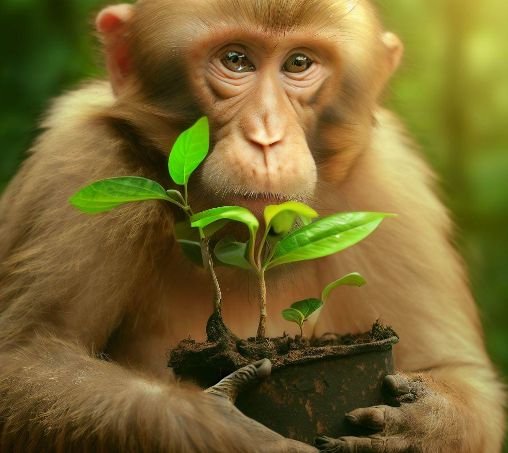Save Plants from Monkeys: Plants play a crucial role in our environment and ecosystem. They provide us with clean air, and food, and contribute to the overall well-being of the planet. However, sometimes our leafy friends face threats from unexpected sources, such as monkeys. Monkeys can damage plants by feeding on their leaves, and fruits, or even uprooting them. If you’re facing this issue and want to protect your plants from monkeys, here are some effective strategies you can implement.
Table of Contents
Save Plants from Monkeys – Protecting Your Garden
Monkeys can be playful and entertaining creatures, but when they start causing damage to your precious plants, it becomes necessary to find solutions to protect your garden. By understanding monkey behavior and implementing preventive measures, you can create an environment where your plants can thrive without the threat of monkey interference.

1. Understanding Monkey Behavior
Before diving into solutions, it’s essential to understand why monkeys target plants. Monkeys are primarily attracted to plants that bear fruits, flowers, or edible leaves. They also seek out plants for shelter and nesting purposes. By comprehending their behavior, we can better develop strategies to safeguard our plants.
2. Physical Barriers
One effective method to save plants from monkeys is by installing physical barriers. Fencing your garden or individual plants can create a physical boundary that prevents monkeys from accessing the plants. Choose a sturdy and tall fence, ideally with electric wires on top, to deter the monkeys effectively.
3. Scare Tactics
Scare tactics can be an efficient way to keep monkeys away from your plants. Utilize visual and auditory deterrents such as scarecrows, reflective surfaces, wind chimes, or even loud noises to startle the monkeys and discourage them from approaching your garden.
4. Repellents and Deterrents
Various natural and commercial repellents can help deter monkeys from your plants. These repellents usually have strong odors or tastes that monkeys find unpleasant. Spraying repellent solutions on plants or placing repellent-infused items strategically can create an undesirable environment for monkeys.
5. Garden Design and Layout
The design and layout of your garden can influence monkey behavior. Avoid planting monkey-attracting species close to the boundaries of your property. Instead, create a buffer zone of less appealing plants or utilize the perimeter for planting deterrent species that monkeys tend to avoid.

6. Pruning and Trimming
Regular pruning and trimming of plants can minimize the appeal to monkeys. Removing low-hanging branches or dense foliage makes it harder for monkeys to access the plants and reduces their overall interest in your garden.
7. Using Monkey-Resistant Plants
Choosing monkey-resistant plants is an excellent proactive measure. Certain plant species have natural defenses against monkeys, such as thorny or prickly surfaces, strong odors, or bitter tastes. Incorporating these plants into your garden can discourage monkeys from targeting your other plants.
8. Collaborating with Local Authorities
If monkey interference is a widespread problem in your area, consider reaching out to local authorities or wildlife conservation organizations. They might have programs or strategies in place to handle the issue and can provide valuable guidance or assistance.
9. Community Efforts
Creating a united front within your community can lead to more effective results. Organize community meetings or workshops to discuss the monkey issue and collaborate on implementing preventive measures. By working together, you can pool resources and knowledge to protect plants collectively.
10. Education and Awareness
Raising awareness about the importance of plants and the impact of monkey interference is crucial. Educate your community, neighbors, and children about the significance of plants and ways to prevent monkey damage. A well-informed community is more likely to actively participate in finding solutions.
11. Providing Alternative Food Sources
One way to divert monkeys’ attention from your plants is by offering alternative food sources. Set up feeding stations or plant fruit trees away from your main garden. By providing monkeys with a designated food source, they are less likely to target your valuable plants.
12. Implementing Noise or Sound Devices
Monkeys are sensitive to sounds and noises. Utilize noise-making devices such as ultrasonic repellents, motion-activated sprinklers, or even playing recordings of distress calls of their natural predators. These methods can startle and deter monkeys, protecting your plants.
13. Employing Guard Dogs
Trained guard dogs can be an effective deterrent against monkeys. Their presence and barking can deter monkeys from entering your garden. Ensure that the dogs are specifically trained to deal with monkey interference without causing harm to the animals.
Protecting your plants from monkeys requires a combination of strategies and approaches. By understanding monkey behavior, implementing physical barriers, scare tactics, repellents, and employing other preventive measures, you can create a monkey-resistant environment for your garden to flourish.

FAQs – Save Plants from Monkeys
1Q. Are all monkeys harmful to plants?
While monkeys can cause damage to plants, not all monkey species are equally destructive. Some monkeys may show less interest in consuming or damaging plants.
2Q. Do scarecrows really work in keeping monkeys away?
Scarecrows can be effective in deterring monkeys, especially if they are made to resemble the natural predators of monkeys. However, it’s important to frequently change their appearance to maintain their effectiveness.
3Q. Can I use commercial chemical repellents to protect my plants?
Yes, there are commercial chemical repellents available specifically designed to deter monkeys. Ensure to follow the instructions and use them responsibly.
4Q. Will installing a fence completely solve the monkey problem?
While a fence can be an effective deterrent, some persistent or agile monkeys may find ways to climb or bypass it. Combining a fence with other preventive measures is recommended for optimal results.
5Q. How long does it take for monkey-resistant plants to work?
The effectiveness of monkey-resistant plants may vary. It might take some time for monkeys to associate these plants with unpleasant experiences and shift their focus away from other plants.





















